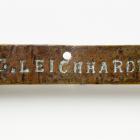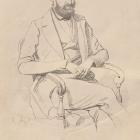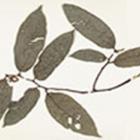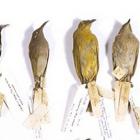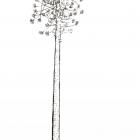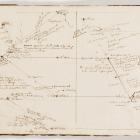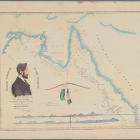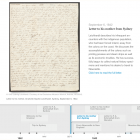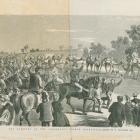Letter to his brother-in-law, Friedrich August Schmalfuß, The Woolshed, or Mr. Dennis’ Station, Darling Downs (6 December 1846)
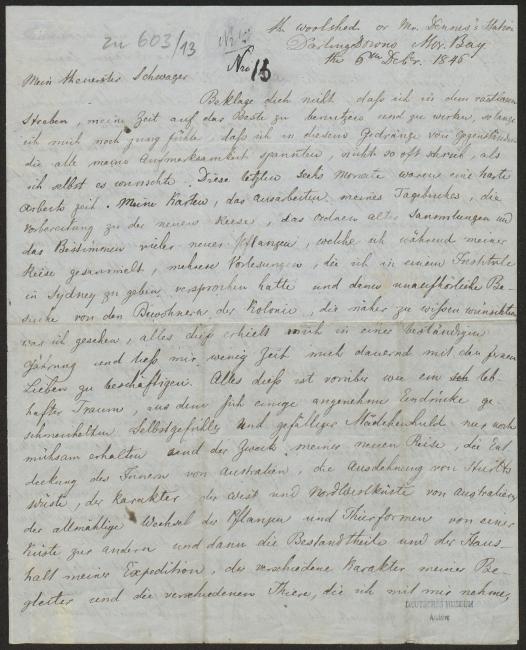
The Woolshed, or Mr. Dennis’s Station, Darling Downs, 6 December 1846
My dearest brother-in-law,
Do not complain that I do not write as often as I myself wish to, occupied as I am with my restless quest to fully utilize and make the best of my time as long as I still feel young, with the crush of subjects that demand all of my attention. These last six months were a time of hard work. My maps, writing up my journal, preparations for the new expedition, organizing old collections, classifying the many new plants that I had collected on my travels, several lectures, which I had promised to give at an institute in Sydney, and then the unceasing visits by colony residents, who wished to learn more specific details about what I had seen—all of this has kept me in a state of perpetual unrest and left me with little time to devote myself more consistently to loved ones faraway. All of this has passed like a vivid dream, of which only a few pleasant impressions of flattered pride and agreeable maidenly grace barely manage to remain, and I spend all day preoccupied with the goals of my new expedition, the exploration of Australia’s interior, the extensiveness of Sturt’s desert, the character of Australia’s west and northwest coast, the gradual changes in flora and fauna from one coast to the other, as well as the equipment and budgeting of my expedition, the various personalities of my companions and the diverse kinds of animals which I am taking with me.
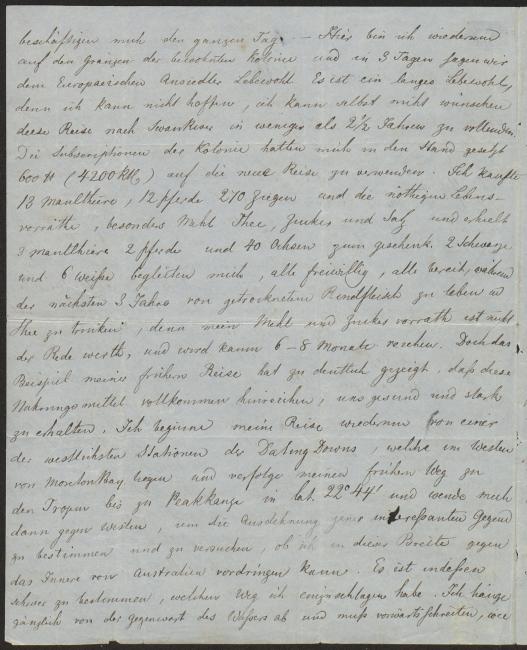
Once again I find myself on the edges of the inhabited colony and in 3 days we shall bid farewell to the European settlers. It will be a long farewell because I cannot hope, I cannot even wish to complete the journey to Swan River in less than 2½ years. The colony’s subscriptions enabled me to spend £600 (4200 Rtl) on this new expedition. I bought 13 mules, 12 horses, 270 goats, and the necessary provisions, especially flour, tea, sugar, and salt, and I received 3 mules, 3 horses, and 40 bullocks as a gift. 2 blacks and 6 whites are accompanying me, all volunteers, all ready to live on dried beef and tea, since my rations of flour and sugar are not worth speaking of and will hardly last 6–8 months. Yet the example of my earlier expedition has made it abundantly clear that this food entirely suffices to keep us strong and in good health. Once more I am setting out on my journey from one of the western stations in the Darling Downs, which are situated in the west of Moreton Bay, and will follow my earlier path to the tropics as far as Peak Range at 22° 44’ latitude, and will then turn westward to determine the expansiveness of that interesting region and to attempt to penetrate Australia’s interior at this latitude. However, it is difficult to determine which path I should take. I am completely dependent on the presence of water, and have to move ahead
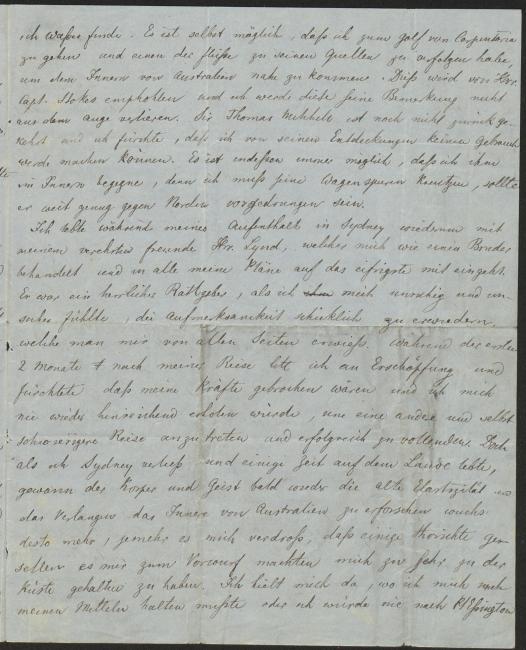
according to where I find it. It is even possible that I will have to travel to the Gulf of Carpentaria and from there follow a river to its source in order to approach Australia’s interior. Captain Stokes recommends this strategy and I will keep his remarks in mind. Sir Thomas Mitchell has not yet returned and I am afraid that I will not be able to make use of his discoveries. Then again, it is always a possibility that I will meet him in the interior since I will surely cross his tracks should he have advanced far enough north.
During my stay in Sydney, I once again lived with my dear friend Mr. Lynd, who treats me like a brother and takes a keen interest in all of my plans. He was a wonderful mentor when I felt anxious and uncertain about how to properly respond to the attention that I was accorded from all sides. I suffered from exhaustion for the first two months after my expedition and feared that my strength was gone and that I would never recover adequately enough to undertake and successfully complete another and even more difficult journey. Yet when I left Sydney and lived in the countryside for a while, my body and my mind soon recovered their old resilience, and the more annoyed I became that a few foolish fellows criticized me for having stayed too close to the coast, the more my desire to explore the interior of Australia grew again. I stayed where I had to stay on account of my supplies or I would have never reached Port Essington,
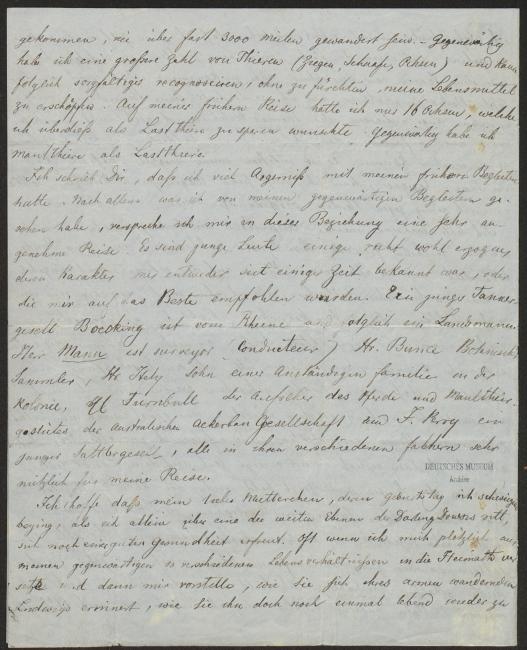
would have never been able to journey across almost 3000 miles. — This time I have a larger number of animals (goats, sheep, bullocks) and can therefore more thoroughly reconnoiter without fear of exhausting my supplies. During my earlier expedition I only had 16 bullocks, which moreover, I sought to spare as pack animals. This time I have mules for pack animals.
I wrote to you that I had a lot of trouble with my earlier companions. After all that I have seen of my present companions, I have high hopes for a very pleasant journey in this regard. These are young people, some of them very well-educated, whose character I have either known for some time, or who came highly recommended. A young tanner’s apprentice, Boecking, is from the Rhine region and hence a compatriot. Mr. Mann is a surveyor, Mr. Bunce a botanical collector, Mr. Hely the son of one of the colony’s upstanding families, Mr. Turnbull the overseer of the Australian Agricultural Society’s horse and mule stud, and J. Perry a young saddler’s apprentice, and their various specializations are very useful for my expedition.
In my will I have stipulated the necessary provisions should it be God’s will that I not see the end of this expedition. It is in the hands of Mr. Lynd. Should this come to pass then I want dear mother to make the same arrangements in her will as I have made in mine. I sent my journal to Dr. Nicholson and I only hope that it will at least make enough money to pay the debt that I owe him. Should this not come to pass then I hope to still be able to correct a mistake I made when making my will.
I hope that my dear beloved mother, whose birthday I silently observed on 9 November as I was riding in solitude across a vast plain in the Darling Downs, is still enjoying good health. Often, when I suddenly imagine myself at home, away from my present, so very different circumstances, and then imagine how she thinks back on her poor, wandering Ludwig, how much she wishes
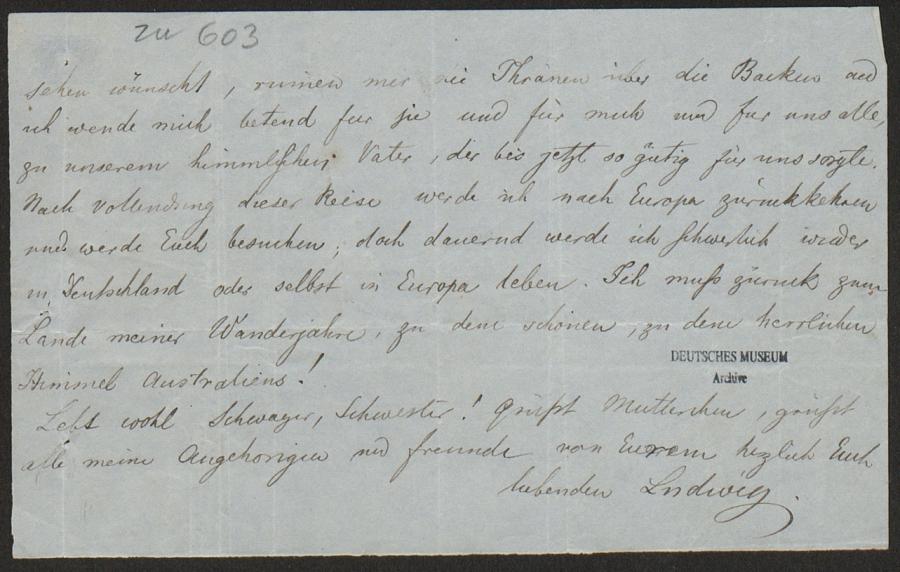
she could see him alive one more time, tears stream down my face and I turn to our heavenly Father, who has so far so kindly provided for us, in prayer for her, for myself, and for all of us. After concluding this expedition I will return to Europe and pay you a visit; yet I would find it difficult to live in Germany or even Europe for good. I must return to the country of my traveling years, return to the beautiful, magnificent skies of Australia!
Farewell, brother-in-law, sister! Convey greetings to dear mother, convey greetings to all of my relatives and friends from your affectionate and loving
Ludwig
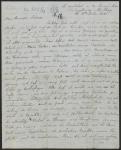
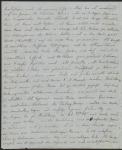
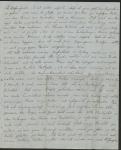
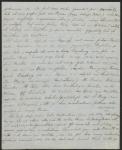

Used by permission of the Deutsches Museum, Munich, Archives, HS 603/13.
English translation by Nadine Zimmerli.




